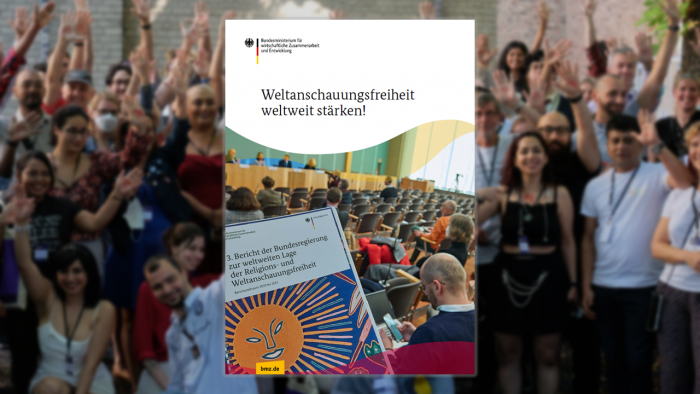»Strengthening Freedom of Worldviews Worldwide!«
Giordano Bruno Foundation Welcomes the Latest Publication by the Federal Commissioner for Freedom of Religion and Worldviews

pm_weltanschauungsfreiheit_schwabe.png
Cover of the brochure, background: photo from the International Ex-Muslim Meeting “Celebrating Dissent” (Cologne 2022)
Frank Schwabe (SPD) seeks to "specifically contribute to strengthening freedom of worldview" as "not only religious people, but also atheists and humanists become victims of persecution and discrimination." The Giordano Bruno Foundation (gbs) views the latest publication by the Federal Commissioner for Freedom of Religion and Worldviews as "decidedly positive."
For a long time, German authorities ignored the religious persecution of non-religious people. One reason was their focus on the right to positive religious freedom (the right to belong to a religion) while largely disregarding the right to freedom of worldviews (such as the right to prefer secular over religious orientation systems). Before Frank Schwabe took office, the role bore the title "Commissioner for Religious Freedom," which the new appointee immediately amended to include "freedom of worldviews." In his latest brochure, "Weltanschauungsfreiheit weltweit stärken!" ("Strengthening Freedom of Worldviews Globally!"), Schwabe explains his interpretation of the term.
In line with the definitions of the Institute for Secular Law (ifw) (see, for example, this essay by Jacqueline Neumann and Michael Schmidt-Salomon), Schwabe defines "freedom of worldviews" as "the right of every individual to freely choose, develop, and, if necessary, change their beliefs regarding religion, atheism, or worldview. This includes the practical life consequences of fundamental convictions." (Own translation) Throughout, Schwabe understands "freedom of worldview" as a "fundamental human right that states must respect, protect, and promote to provide space for diversity of beliefs and ensure respect for individual worldviews." Therefore, the "persecution of atheistic and non-religious people" is "a human rights violation that must be addressed to create a just, free, and pluralistic society."
Religious Persecution of Non-Religious People
Fortunately, the Federal Commissioner for Freedom of Religion and Worldviews does not stop at abstract principles but also addresses the specific challenges faced by secular refugees in Germany: "In many Islamic countries, outspoken atheists face persecution. In Germany, asylum seekers who do not believe in God face threats. Refugees suffering discrimination and persecution due to their atheism in their home countries are often not recognized as a distinct group with unique concerns. These individuals need protection when they are threatened and intimidated in refugee accommodations…”
Schwabe illustrates this with concrete cases, such as the story of Rana Ahmad (a gbs scholarship recipient and co-founder of the Atheist Refugee Relief, see bruno.2019, pp. 6-11), who had to flee Saudi Arabia due to her humanist activism. In this context, the Federal Commissioner asserts that "people facing charges and persecution for leaving their faith (apostasy) have a human rights-based claim to asylum."
Secular Demands Deserve Serious Discussion
On September 9, Frank Schwabe met with representatives of secular organizations (including gbs, Atheist Refugee Relief, the Zentralrat der Konfessionsfreien, and the Central Council of Ex-Muslims) for a roundtable expert discussion. In the brochure, he now lists key demands from these groups such as the consistent secular neutrality of the state, equal status of non-religious organizations with churches, standardization of labor law, cessation of state payments to religious institutions, or equal representation in public media. Schwabe argues that these demands deserve to be "seriously discussed and politically addressed."
While Schwabe shares some of these political demands, he disagrees with others. For example, he explicitly endorses the "representation of secular organizations on ethics councils, broadcasting boards, or federal review bodies" as "an expression of the right to freedom of worldviews." However, he opposes the secular demand to "declare religion a private matter," arguing that this would, in his opinion, contradict the "very socially important public exercise of freedom of religion and worldviews guaranteed by Article 18 of the Universal Declaration of Human Rights, which is socially significant."
A Step in the Right Direction
This disagreement, however, stems from a misunderstanding, as gbs spokesperson Michael Schmidt-Salomon explains: "Treating religion as a private matter does not mean believers may only pray in private! Of course, religious communities should continue to contribute to public debate – just on equal footing with other private nonprofit organizations, such as the B.U.N.D. or Amnesty International, rather than – as before – enjoying privileged status as 'corporations under public law'! This special corporate status, which turns churches into 'states within a state,' has repeatedly led to significant problems in the past, as demonstrated by the prolonged cover-up of the clerical abuse scandal.”
Despite these nuances, Schmidt-Salomon views the Federal Commissioner's latest publication as "decidedly positive": "This is a step in the right direction! Frank Schwabe has clearly recognized the central importance of freedom of worldviews in a modern constitutional state. Unfortunately, this insight has yet to reach other federal ministries, such as the Ministry of Education, which this year rejected funding for the humanist Bertha von Suttner Foundation on highly dubious grounds. Religious worldviews continue to be privileged over non-religious ones in many ways, even though this directly contradicts the constitutional mandate for the state's worldview neutrality. In this regard, we still have some tough nuts to crack.”
